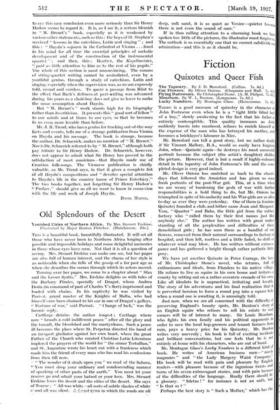Old Splendours of the Desert .
Vanished Cities of Northern Africa. By Mrs. Steuart Erskine. illustrated by Major Benton Fletcher. (Hutchinson. 24s.) Tins is a beautiful book, beautifully illustrated. It will set all those who have never been to Northern Africa longing after possible and impossible holidays and rouse delightful memories in those whose eyes have seen. Not that it is all a question of seeing:. Mrs. Steuart Erskine can make one see, but her pages arc also full of human interest, and the charm of her style is as noticeable when she tells of the gossip of a far. past age as when she describes the scenes through which its actors moved.
• Turning over her pages, we come to a chapter about " Sfax and the Lesser Syrtis.". Mrs. Erskine. delights us with tales of the Barbary Pirates, specially of Dragut, whom Andrea Doria (in command of part of Charles V's fleet) imprisoned and loaded with chains. In his captivity he was visited by Parisot, grand master of the Knights of Malta, who had himself once been chained to his oar in one of Dragut's galleys.
Fortune of war," said Parisot. ." Change of luck," was the laconic reply.
Carthage detains the author longest ; Carthage where now " broods a cold indifferent peace " after all the glory and the tumult, the bloodshed and the martyrdoms. Such a peace ill becomes the place where St. Perpetua directed. the hand of
an inexpert gladiator against her own heart, where the great Father of the Church who created Christian Latin Literature implored the prayers of the world for " the sinner Tertullian," and St. Augustine wrote his heart out with a frankness which Made him the friend of every man who has read his confessions from then till now.
" The wonder of it steals upon you " we read of the Sahara:: 4.You must drop your ordinary and condescending manner of speaking of other parts of the earth." You must let your.- reserve go and admit your hatred or your love. Mrs. Steuart Erskine loves the desert and thecities-of the desert. She says of TOZeUr : " All was white—all sorts of subtle shades of white -and all was silent. A fLt7eift own in which the roads are all deep, soft sand, it is as quiet as Venice—quieter because there is not even the sound of oars."
If in thus calling attention to a charming book we have spoken too little of the pictures, the illustrator must forgive us, The outlook is so essentially one that we cannot subdivide our
admiration—and this is as it should be. -






























































 Previous page
Previous page